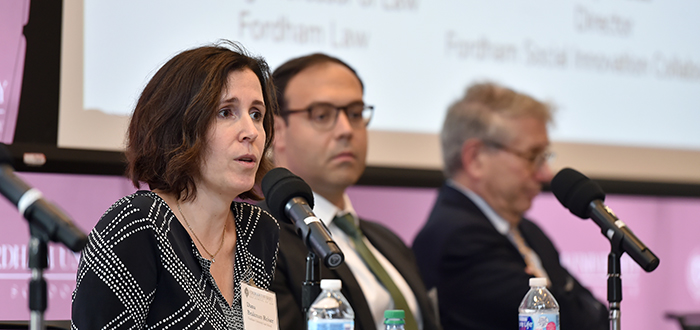Strict privacy laws. Heated disputes involving intellectual property. The risks and rewards of offshoring. These are just a few issues that Sean Coutain has to reckon with, working in compliance for a big tech company.
“If you have an app you can download anywhere in the world, you’re subject to jurisdiction anywhere in the world,” said Coutain, Snap’s deputy chief compliance officer, during a September 14 event at Fordham Law School that addressed the multiform law-related issues facing technology startups.
The event, hosted by the School’s Entrepreneurial Law Program and Clinic, was titled “From Silicon Valley to Silicon Alley: Hot Topics at the Intersection of Law and Entrepreneurship.” It consisted of four panels with a range of speakers from technology, legal, and education sectors.
The first panel explored legal issues surrounding intellectual property and technology transactions. A primary issue of concern for the hour was personal data mining.
Personal information is a marketer’s pot of gold, but from a lawyer’s point of view it can represent the fire-breathing dragon. What should companies do to harness this valuable data while also avoiding its potential danger and staying on the right side of the law? Coutain offered words of caution for the entrepreneurs in the audience. “It’s a thorny issue…you have to talk to a lawyer in the field,” he said.
Panel two addressed recent developments in securities law, initial coin offerings (ICOs), and equity crowdfunding. Clinical Professor Ron Lazebnik began by debriefing the audience on ICOs, which are a type of funding that uses cryptocurrencies, such as Bitcoin.
There are many new legal hazards to be reckoned with in the often-chaotic fields of crowdfunding and ICOs. In 2018 already, lawsuits involving cryptocurrency have tripled, as compared to the entire past year. The panelists agreed that a significant number of investors in cryptocurrency do not understand the laws surrounding these transactions.
But panelist James Jalil, adjunct professor at Fordham Law, remains optimistic about the future. “Technology ultimately becomes valid over time,” he said. While technologies like the Internet and smartphones were initially questioned when they first were developed—not in the least because of the legal can of worms they opened up—they eventually became ubiquitous for their practical application. Jalil encouraged the audience to think about cryptocurrency not as a radically new technology but rather as an updated version of a familiar concept.
Alumnus and adjunct professor Karl P. Kilb III ’95 delivered the conference’s keynote address. Kilb talked about his path to Fordham Law and his current work as CEO of Boloro Global Limited, before he offered guidance to the students and entrepreneurs present.

Kilb told the audience of more than 100 that he didn’t expect to be CEO of a tech company. But when opportunity knocked and his interests began to shift, he knew he had to react. He advised the attendees to be similarly nimble. “Ask yourself,” he said, “what would you do if you thought you had a very defined career path, and all of a sudden, you saw what you thought was the next big thing?”
Panel three, dealing with access to capital for social entrepreneurs, followed Kilb’s speech. The discussion dealt with startups that seek solutions to social problems, and the unique issues they face.
Panelist Dana Brakman Reiser, visiting professor at Fordham Law, had some advice for conscientious social entrepreneurs pursuing capital. “Start worrying only when you start to seek investors who don’t share your message or values,” she said.

The final panel of the day addressed the untapped potential of minority and female entrepreneurs. For underrepresented groups, access to capital is much more limited, and thus, startups have trouble getting off the ground. An array of cultural and personal biases comes into play.
“Resist the natural inclination towards pattern recognition—the idea being that if you see an entrepreneur who you would not expect, listen a little more,” said panelist Alice Vilma of Morgan Stanley’s Multicultural Innovation Lab.

A launch party for the Startup LAWnchpad podcast followed the final panel. Episodes of the podcast will feature Fordham Law professors, alumni, and students discussing various legal topics related to entrepreneurship, including founders’ agreements, entity formation, IP protection, seed financing, employment law, and privacy policies.
Fordham’s Entrepreneurial Law Program is made possible by the generous support of The Nasdaq Educational Foundation and Fordham’s Entrepreneurial Law Advisory Council. The conference was co-sponsored by Fordham’s Corporate Law Center as the Eugene P. and Delia S. Murphy Conference on Corporate Law.

